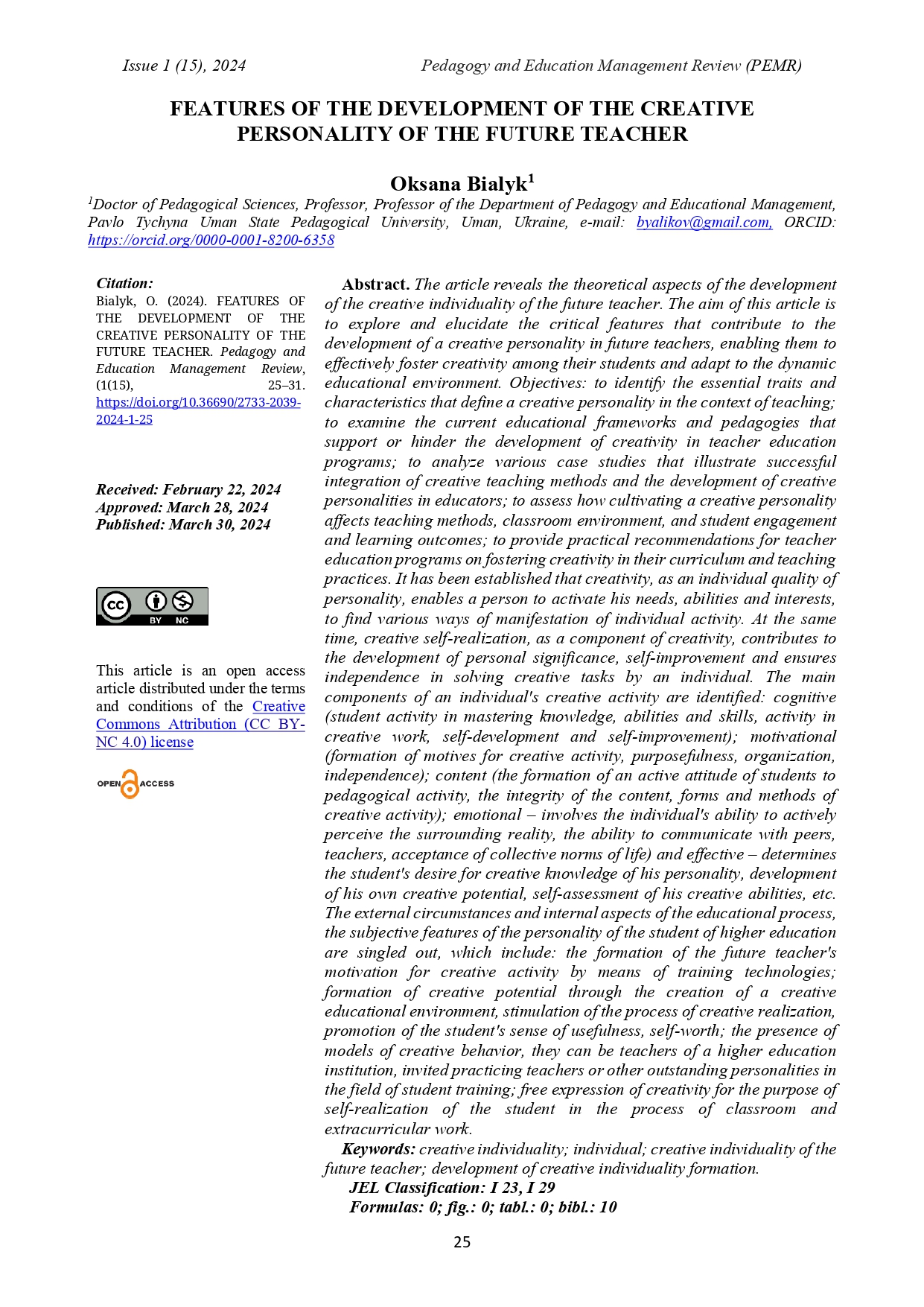FEATURES OF THE DEVELOPMENT OF THE CREATIVE PERSONALITY OF THE FUTURE TEACHER
DOI:
https://doi.org/10.36690/2733-2039-2024-1-25Keywords:
creative individuality, individual, creative individuality of the future teacher, development of creative individuality formationAbstract
The article reveals the theoretical aspects of the development of the creative individuality of the future teacher. The aim of this article is to explore and elucidate the critical features that contribute to the development of a creative personality in future teachers, enabling them to effectively foster creativity among their students and adapt to the dynamic educational environment. Objectives: to identify the essential traits and characteristics that define a creative personality in the context of teaching; to examine the current educational frameworks and pedagogies that support or hinder the development of creativity in teacher education programs; to analyze various case studies that illustrate successful integration of creative teaching methods and the development of creative personalities in educators; to assess how cultivating a creative personality affects teaching methods, classroom environment, and student engagement and learning outcomes; to provide practical recommendations for teacher education programs on fostering creativity in their curriculum and teaching practices. It has been established that creativity, as an individual quality of personality, enables a person to activate his needs, abilities and interests, to find various ways of manifestation of individual activity. At the same time, creative self-realization, as a component of creativity, contributes to the development of personal significance, self-improvement and ensures independence in solving creative tasks by an individual. The main components of an individual's creative activity are identified: cognitive (student activity in mastering knowledge, abilities and skills, activity in creative work, self-development and self-improvement); motivational (formation of motives for creative activity, purposefulness, organization, independence); content (the formation of an active attitude of students to pedagogical activity, the integrity of the content, forms and methods of creative activity); emotional – involves the individual's ability to actively perceive the surrounding reality, the ability to communicate with peers, teachers, acceptance of collective norms of life) and effective – determines the student's desire for creative knowledge of his personality, development of his own creative potential, self-assessment of his creative abilities, etc. The external circumstances and internal aspects of the educational process, the subjective features of the personality of the student of higher education are singled out, which include: the formation of the future teacher's motivation for creative activity by means of training technologies; formation of creative potential through the creation of a creative educational environment, stimulation of the process of creative realization, promotion of the student's sense of usefulness, self-worth; the presence of models of creative behavior, they can be teachers of a higher education institution, invited practicing teachers or other outstanding personalities in the field of student training; free expression of creativity for the purpose of self-realization of the student in the process of classroom and extracurricular work.
Downloads
References
Androshchuk L. (2004). Formuvannia tvorchoho indyvidualnoho styliu diialnosti maibutnoho vchytelia khoreohrafii malokomplektnoi shkoly zasobamy improvizatsiinoi plastyky. Psykholoho-pedahohichni problemy silskoi shkoly: zbirnyk naukovykh prats Umanskoho derzhavnoho pedahohichnoho universytetu imeni Pavla Tychyny. Kyiv: Naukovyi svit. pр. 48–53.
Bialik O.V. (2023). Theoretical foundations of the development of the creative individuality of the future teacher. Herald of science and education. № 10(16). pр. 396–405.
Kapustinskyi K. V. (2018). Teoretychni zasady problemy rozvytku tvorchoho potentsialu maibutnikh khoreohrafiv u zakladakh vyshchoi osvity. Pedahohichni nauky: realii ta perspektyvy. Vypusk 63. Seriia 5. Рр. 57–61.
Makar L. (2013). Sutnist osvitnoho seredovyshcha v pedahohichnomu protsesi. Pedahohika formuvannia tvorchoi osobystosti u vyshchii i zahalnoosvitnii shkolakh. № 30. pр. 229–236.
Murtazaieva E. M. (2004). Indyvidualno-tvorchyi rozvytok maibutnikh pedahohiv. Pedahohika i psykholohiia. № 3(44). pр. 69–76.
Otych O.M. (2011). Rozvytok tvorchoi indyvidualnosti studentiv profesiino-tekhnichnykh navchalnykh zakladiv zasobamy mystetstva: monohrafiia; za nauk. red. I. A. Ziaziuna. Chernivtsi: Zelena Bukovyna. 246 p.
Saleichuk E. V. (2021). Pedahohichni umovy rozvytku tvorchoho potentsialu maibutnikh uchyteliv heohrafii. Pedahohika formuvannia tvorchoi osobystosti u vyshchii i zahalnoosvitnii shkolakh. № 74(3). pр. 115–120.
Sysoieva O, Osnovy pedahohichnoi tvorchosti. Kyiv. Ukraina: Milenium, 2006.
Kholodenko V. (2013). Sutnist, zmist ta struktura tvorchoi aktyvnoi osobystosti, Naukovi zapysky. Seriia «Psykholoho-pedahohichni nauky». № 1. pр. 84–88.
Mihus, I., & Nakonechna, N. (2022). THE ROLE OF COMMUNICATIVE COMPETENCE IN THE STRUCTURE OF SOCIAL INTELLIGENCE OF TEACHERS OF HIGHER EDUCATION INSTITUTIONS. Public Administration and Law Review, (4), 75–86. https://doi.org/10.36690/2674-5216-2022-4-75.







